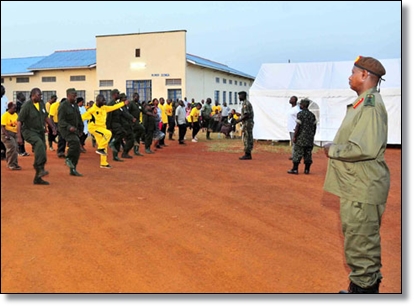Uganda: Deepening NRM’s Strength
 |
|
NRM Mps undergo a drill as their Party Leader watches |
I wish to put forward two ideas that will help us deal with some of these self-inflicted challenges. Going into 2016 general elections and beyond, NRM members, leaders, cadres, activists, operatives and ideologues will need to reflect on the two ideas below.
A: The Office of the Secretary General
NRM in accordance with its Constitution (adopted May, 2003) has a political Secretary General (SG). The office of Secretary General is an elective position occupied by a politically elected SG. The problem with this arrangement is that the office would be occupied by a leader with both supporters and non-supporters (Non supporters in this case are members of the NRM who voted opponents of the SG in office). The SG is therefore, most likely to be viewed by section of party members through intra partisan lenses.
This has potential to undermine activities of the SG and create friction amongst members. The other problem is that a situation where a reigning SG organizes his own election becomes self-evident. Such a situation breeds democratic imbalance when it comes to electing the next secretary General. This particular complaint was raised during the last NRM National Conference at Nelson Mandela Stadium- Nambole. In fact, opponents of the in-office SG strongly pointed out that the ground was not level and tilted in favor of the one organizing the elections, managing accreditation, running the NRM register and all the paraphernalia that go with electioneering. This can’t be ignored.
The NRM constitution should therefore be amended to change the position of the current politically elected Secretary General into a ‘business’ Secretary General, competitively procured and appointed by the National Executive Council or an appointment’s committee mandated by National Executive Council in accordance with an amended NRM constitution that caters for an appointed SG. The business Secretary General should be mandated to work as the full time, competitively remunerated Chief operations officer, running the NRM secretariat in a technical professional manner, and evaluated on agreed performance benchmarks and indicators set by the National Executive Council or a body and or a committee mandated by National Executive Council. The foregoing will require amendment of the NRM constitution – especially article 16 which deals with mandate and management of the NRM secretariat.
B: The issue of NRM Party Primaries
NRM is a mass party with huge grassroots presence and primaries conducted to sieve the best party candidates to compete against other political parties is a standard democratic procedure and NRM has excelled on that practice compared to other political parties in Uganda and the region. The mass primaries have helped NRM to interact more with the population and involve party membership in politics of self-determination.
My concern, however, is on how these primaries are conducted. First there is the problem of elections calendar. Secondly, the issue of limited time to handle complaints, and managing the healing process for those who lose primary elections because NRM primaries and national general elections are held back to back. Because of the foregoing, NRM has entered elections fractured, exhausted, divided at the grassroots and party candidates financially constrained. In fact some Independent and Opposition parties took advantage of this situation to win elections in some areas. This should not be allowed to happen again
It may be already late for 2016 general elections, but in future, NRM should consider holding primaries at least two years to general elections. The NRM electoral commission should release Party elections Calendar early to allow preparations for vetting and election processes. These primary elections should not be held on one day. Being a huge logistical operation, primary elections on a single day creates potential for inefficiencies and is costly for the party. The NRM electoral commission can organize these elections within a space of four months through an agreed cluster of constituencies in districts or sub regions.
In spite of challenges experienced by all rising nation states on earth, NRM remains the only party in Uganda with a superior ideology that is anchored on the four core values of Nationalism, Anti-sectarianism, Pan-Africanism and Social Economic transformation. The record is also clear; under President Museveni, Uganda has made tremendous progress and continues to experience years of peace, stability and social-economic development. The NRM facilitated the making of a pro-people constitution, maintains the rule of law, restored democracy, and has put up a tradition of holding free and fair regular elections. The economy is performing well recording unprecedented growth. Consumer and production goods (some made in Uganda) are now available in all parts of Uganda. The tax base has been widened and now government can finance its own development agenda. Because of the conducive business environment, Uganda is now the leading destination country for Foreign Direct Investments in East Africa. Government has been undertaking the facilitating role through the provision of conducive policy, institutional and regulatory framework and the public private partnerships. With such a record, NRM remains a party that majority of Ugandans call home. We have to keep strengthening it.
By Morrison Rwakakamba
NRM Party Card Holder, Nyeibingo, Rukungiri
mrwakakamba@gmail.com
